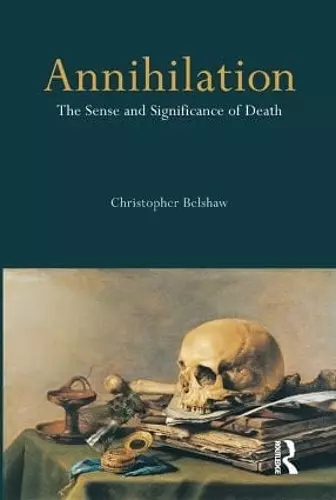Annihilation
The Sense and Significance of Death
Format:Paperback
Publisher:Taylor & Francis Ltd
Published:19th Dec '08
Currently unavailable, and unfortunately no date known when it will be back
This paperback is available in another edition too:
- Hardback£145.00(9781844651344)

The ever-present possibility of death forces upon us the question of life's meaning and for this reason death has been a central concern of philosophers throughout history. From Socrates to Heidegger, philosophers have grappled with the nature and significance of death. In "Annihilation", Christopher Belshaw explores two central questions at the heart of philosophy's engagement with death: what is death; and is it bad that we die? Belshaw begins by distinguishing between literal and metaphorical uses of the term and offers a unified and biological account of death, denying that death brings about non-existence. How our death relates to the death of the brain is explored in detail. Belshaw considers the common-sense view that death is often bad for us by examining the circumstances that might make it bad as well as the grounds for thinking that one death can be worse than another. In addition, Belshaw explores whether we can be harmed after we die and before we were born. The final chapters explore whether we should prevent more deaths and whether, via cryonics, brain transplants, data storage, we might cheat death. Throughout Belshaw shows how questions of personhood and life's value are bound up with our views on the sense and significance of death. "Annihilation's" in-depth analysis and insightful exposition will be welcomed not only by philosophers working on the metaphysics of death but also by students and scholars alike looking for a foundation for discussions of the ethics of abortion, euthanasia, life-support and suicide.
A wonderful book. Belshaw writes both clearly and elegantly, and does an excellent job of outlining the views of others so that the framework of the contemporary debate is clear, evaluating them, and then developing distinctive views of his own. Annihilation is one of those rare books that both makes significant contributions to the debate of which it is a part, and yet which is still accessible enough to be read by all with an interest in its topic. It is highly recommended." – Journal of Applied Philosophy
"Belshaw helpfully lays out the most important issues and critically discusses alternative proposals in the literature. Often his critiques are compelling, and they are always worth careful attention. The book is chock full of argumentation that frequently calls into question attractive views that are deemed plausible (and defended) by other philosophers. Even when Belshaw is not entirely convincing, his discussions are invariably subtle, sophisticated and illuminating. A very fine book. It is highly recommended." – Notre Dame Philosophical Reviews
"Engaging and insightful. A good book. ... It will interest many thoughtful people, especially those who have spent restless nights thinking about life's ending." - Steven Luper,The Philosophical Quarterly
"A very good book. It is clearly written. The structure of the discussion and the distinctions made aid the navigation of the subject matter. Where Belshaw engages with other writers, his criticisms are sharp and largely persuasive. His own views are well argued for. Many of the conclusions he reaches are hard to disagree with. It is apparent to the reader that Belshaw is thinking carefully and deeply not just about the subject matter but about how to do philosophy. . . an interesting and provocative book." – Journal of Value Inquiry
"A very good book. It addresses many of the most interesting and important philosophical issues concerning death, is well-informed by the relevant literature, and offers Belshaw’s distinctive and suggestive views on a range of issues. Belshaw offers a nice combination of philosophical rigour and a crisp, accessible writing style that should give the book a broad appeal." – John Fischer, University of California, Riverside, USA
"Belshaw's premise is that life is worthwhile, but, in the final analysis, the only one who can make a judgement of the worth of that life is the person whose life it is. This question, of the worth of life, is thought provoking and makes a significant contribution to the ongoing dialogue on the value placed on humans as persons and the myriad of possible configurations of what it is (and could be) to be a human person." – Nursing Ethics
ISBN: 9781844651351
Dimensions: unknown
Weight: 453g
288 pages